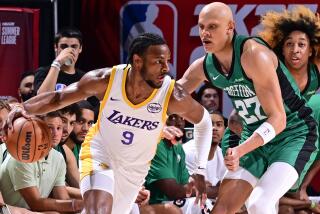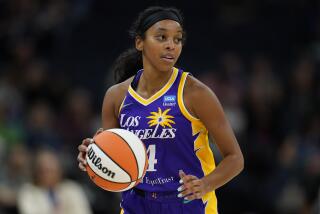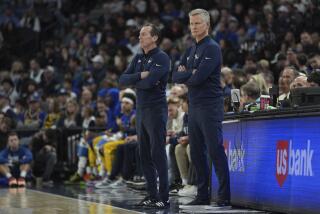Road to Gold
AUBURN HILLS, Mich. — The sun doesn’t always shine on the same superstar coach’s backside, the Lakers’ Phil Jackson learned last week.
It’s party time here in what was known as Hockeytown USA when the other local pro franchises were bottoming out but has suddenly been recast into a basketball mecca as the Sons of the Bad Boys try to finish off What’s Left of the Lakers.
This is a monster turnaround, even if it can be summed up in two words:
Larry Brown.
Others coach. Brown bottles lightning, as he did in his first season at UCLA when he had four freshmen in the rotation and Sports Illustrated did its “Bruins in Ruins” piece, after which they went all the way to the NCAA final.
He did it at Kansas, when he won a national title with a decimated team that was 12-8 with 10 games left.
He’s close to doing it again with the Detroit Pistons, who trailed the Nets, 3-2, going back to New Jersey for Game 6 in the second round, started this series as overwhelming underdogs and are three-fourths of the way to shocking the world.
Brown’s teams are always in ruins. They start slowly. Meanwhile, he yearns to trade all his players, or at least 11 of the 12. Then he takes them to new heights and leaves within another year or two to begin the process anew elsewhere, at an even higher rate of pay.
At 63, having coached 10 teams in the NBA, the old ABA and the NCAA, his salary is up to $5 million. But this, if the Pistons win it, will be his first NBA title, after 32 seasons. It will also make him the first to win titles in the NCAA and the NBA, and, as coach of the U.S. Olympic team, he could complete the unprecedented hat trick this summer.
Even for a purist, who insists he really cares only that his teams max out their potential, that would be nice.
For starters, he’d never have to answer that question about never winning in the pros again.
“I’m reminded about it every day from people that really care about me,” Brown said last week. “For them, I think it means everything.
“But for me, that’s the goal, obviously. I mean, I loved Red Holzman. I love Red Auerbach. I played for Alex Hannum. Those guys all experienced that [winning titles.] I love this league and after being in this league for as long as I have, I realize, unless you’re Phil Jackson, these opportunities don’t present themselves very often.”
Brown is always surprising people, but this has been the biggest surprise of all, coming off his hardest move, dismayed at being vilified in Philadelphia, living in a hotel room here with his family still back there.
Nor were the Pistons sure they wanted him.
When the shocking order to fire Rick Carlisle came down from owner Bill Davidson last summer, basketball boss Joe Dumars simply grabbed the best man he could find, hoping to avoid classic pitfalls, like letting Brown run personnel, as he did in Philadelphia, or letting him take the team down as fast as he took it up.
Even now, insiders think Brown is a short-term fix and could even be gone in one more season.
On the other hand, it will have been some great run. It might just have been a lunatic they were looking for, after all.
It’s a Mad, Mad, Mad, Mad World
Of course, Brown isn’t really crazy, or at least no crazier than his peers.
As Miami’s Pat Riley, the fashion icon and renowned cool cat, once remarked, the only difference between Brown and other coaches is, Brown expresses what they all think but don’t dare express ... such as the desire to recycle entire rosters, or relocate.
There may be calmer coaches, like Jackson, and some who are better at working with superstars, like Jackson, and some who are luckier, like Jackson, who has won nine NBA titles to Brown’s none.
On the other hand, no one can touch Brown, who has never failed to take any of his 10 teams to heights they barely dreamed of.
Just how he did it, of course, is hard to determine.
“Larry inherited me as an assistant coach with the Clippers,” says John Hammond, now the Pistons’ personnel director. “I had been a college coach at little Southwest Missouri State when Larry was at Kansas. We played them in the NCAA tournament one year. I watched him win an NCAA tournament at Kansas.
“Now, all of a sudden, he becomes the head coach of the Clippers. I’m here, I’m thinking, ‘Oh my gosh, I’m going to have a chance to learn secrets about this game and watch someone who does it different than anyone else.’
“And being with him, I realized that there are no real tricks to what he does.
“I have a lot of people ask me this question, ‘How’s he do it? What makes him different?’ It’s nothing more than good, simple, sound teaching and that sounds so boring, there’s got to be more to it than that....
“If you ask Ron Harper and Danny Manning and Kenny Norman [who played for Brown as Clippers in 1992 and 1993] how he did it then, he’s doing it the same today.”
The difference is that every coach tells his players to move the ball, as Brown does. Then those players go onto the floor, where some of them do what the coach says, some try and fail, and some don’t even try.
Most coaches will work around players’ abilities, foibles and attitudes, which is the NBA way. Brown is like a college coach, whose players do it his way or he finds some who can.
Brown is famous for his go-’rounds with such stars as Manning and David Robinson. In Denver, he signed off on trading Bobby Jones for George McGinnis, then asked General Manager Carl Scheer to trade McGinnis after his first practice.
Brown and Reggie Miller never fell out in Indiana, because Miller was too far ahead of the game. The Pacers, who had never won an NBA playoff series, went to the East finals in Brown’s first two seasons, but then the usual frustrations set in, with Brown complaining one day that they lacked leadership.
“If Larry says we lack it,” said Miller, “we lack it.”
Most famously, there was Allen Iverson, the hardest case of all, a high-volume, low-percentage shooter whose wild, street game was anathema to Brown, the purist’s purist.
So Brown turned Iverson into a 5-foot-11 shooting guard, pairing him with a 6-3 point guard off the waiver wire, Eric Snow. The 76ers, who’d won 22 games the season before Brown arrived, were in the NBA Finals in four seasons.
Improbably enough, Brown and Iverson were together for six seasons, Brown’s longest stay anywhere. They even learned to respect each other, but Iverson remained Iverson and Brown remained Brown.
Brown had left eight other jobs, several of them with bad feelings. The Nets were upset at reports that he was talking to Kansas before he left in 1983.
Of course, UCLA administrators were upset two years before, when Brown was reportedly talking to the Nets before leaving Westwood.
No one took it too seriously. UCLA actually hired him back in 1988, when he accepted the job, flew back to Kansas, changed his mind
On the other hand, there’s no other place like Philadelphia, where fans don’t hold grudges longer than a decade or two.
“Allen, I know there was talk of issues with me,” Brown says, “but most of the issues were not because he didn’t care or he didn’t try hard.
“I was always frustrated that he never realized the impact he had on young people and how much more he can do for our game because of how special he was. And I didn’t know if I could ever get that across. Not because he didn’t want to, but because of a lot of issues around him.
“And then when I left, it was almost like I was a traitor and in my heart, I thought it was all I could do. I couldn’t do anymore. So that bothered me because I thought people in Philly would say, ‘Hey, the guy went as far as he could, the team wasn’t going to get any better.’
“So I take the Detroit job, I think for the right reasons, and then I impact Rick Carlisle’s life without realizing it, even though they had made a decision that he’s gone. Didn’t give that any thought.
“It happened so late, I impacted my whole family. Shelly [his wife] was ready to go to Houston, she had that in her mind. I left the meeting [with the Rockets] and I was going there.
“LeBron [James] called me the day of the lottery, right after [the Cleveland Cavaliers] picked his name out. He calls me, so I thought that was a possibility.
“And then my owner [76ers’ boss Ed Snider] calls [Clipper owner] Donald Sterling even before I even resigned and said, ‘Larry’s not coming back. I want you to know that his wife’s from there and that would be a great place for him.’
“This thing happened so suddenly, so we weren’t prepared, so the kids stayed in school. Our kids are so happy in Philly. So it was really more difficult. I felt like I’ve been on the road for 100 games....
“I was starting to remember a lot of things that happened with Madison and L.J. [his children with Shelly] that I realized I missed with Kristie and Alli [his grown-up daughters from his first marriage], and I didn’t want that to happen again. And, lo and behold, here I am in Detroit and they’re there.”
One thing about being Larry Brown, you’re never short of options.
Showdown in Motown
Not that this particular option looked so good.
In 2001, while the Lakers were mopping up Brown’s 76ers in the Finals, the Pistons were headed for oblivion. Grant Hill was leaving for Orlando, and attendance was in the dumper when Dumars, the last Bad Boy in the organization, took over the basketball operation.
Not that Dumars had things to learn, but he had planned to attend Wimbledon, which coincided with the July free-agent signing period, since he didn’t think they’d get anyone.
Tennis had to wait. Hill wanted a $100-million deal, rather than the $80 million he’d be limited to as a free agent, so the Magic was obliged to trade someone to the Pistons.
With little leverage, the Pistons had to take what they could get, which was going to be better than nothing.
It turned out to be a lot better -- Ben Wallace, an undersized 24-minute-a-game power forward.
A year later, Dumars hired Carlisle, who took a 32-50 team to 50-32, became coach of the year, won 50 again the next season, finished fourth in the voting, and was fired.
Carlisle, preoccupied and often brusque, had alienated Tom Wilson, Davidson’s right-hand man. Next thing you knew, it was adios, Ricky.
Dumars grabbed Brown, although he was well aware of Brown’s foibles and had no intention of repeating the 76ers’ mistake of turning the whole operation over to him.
Brown vacillated between loving his players and wanting to move every last one of them. His friend and former boss, Pacer President Donnie Walsh, once said that if you did everything Brown wanted, you’d trade all your players and wind up reacquiring them.
Brown was used to taking someone else’s mess and organizing it, according to his own vision. Now he was taking Carlisle’s vision, which he would want to deconstruct.
It didn’t take long before Brown was remaking Chauncey Billups, a scoring point guard, into a playmaker, and becoming skeptical of Mehmet Okur.
The Pistons knew they’d take a hit for passing up Carmelo Anthony to take Darko Milicic, but Brown wouldn’t even let the 19-year-old 7-footer near the floor.
With Rasheed Wallace unhappy in Portland, Brown asked Dumars to trade for him. Dumars held off on that until midseason when the price dropped so drastically, it became a no-lose proposition, costing them only Lindsey Hunter, whom they reacquired, Chucky Atkins and a low No. 1 pick.
Rasheed is a mixed blessing, big, athletic and versatile but self-effacing on the floor, often disappearing in games, and volatile anywhere.
Even in his new “reformed” incarnation, in which he talks to the media, his responses to the most fawning questions are barbed, like this exchange after he’d scored 26 points in Game 4:
Question: “People used to say you didn’t like to go down to the post, but you’re kind of living down there. Do you feel that’s a misperception of you or have you changed what you’re doing?”
Answer: “No. Hell, yeah, it’s a misperception. When I was in high school and North Carolina, it wasn’t called for me to go out onto a wing. I didn’t start going out on the wing till I played at Portland.... So I don’t know where you got that from.”
Nevertheless, at 6-11, Rasheed turned the Pistons from a small team to a big one. They were 34-22 when they got him, finished 20-6 and here they are today.
Giddy as everyone is, there’s still speculation that Brown could return exhausted from the Olympics, keep Milicic on the bench, that Brown isn’t destined to stay long.
Nevertheless, it’s fine for the moment, which is all he ever asks.
During a lull at practice, last week, Brown sat watching two ballboys play one on one at the Palace. The next thing you knew, he was giving them pointers, and when they did it right, cheering them on.
This all works for him. There are good times and bad times, but there never have been any times to compare to these.
*
(BEGIN TEXT OF INFOBOX)
Final Stop?
Seven NBA teams and 21 seasons later, Larry Brown can win his first NBA title if his Detroit Pistons win once more:
*--* Teams (Seasons) Record Best finish Denver (3) 126-91 Lost in conf. finals New Jersey (2) 91-67 Lost in first round San Antonio (4) 153-131 Lost in conf. semifinals CLIPPERS (2) 64-53 Lost in first round Indiana (4) 190-138 Lost in conf. finals Philadelphia (6) 255-205 Lost in NBA Finals Detroit (1) 54-28 Leads 3-1 in Finals
*--*
More to Read
All things Lakers, all the time.
Get all the Lakers news you need in Dan Woike's weekly newsletter.
You may occasionally receive promotional content from the Los Angeles Times.






